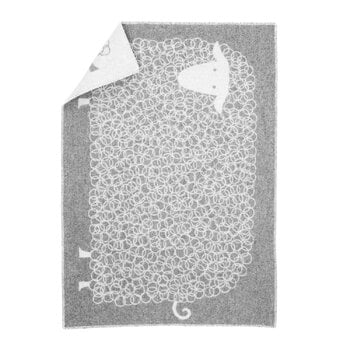The Kili blanket, designed by Masaru Suzuki for Lapuan Kankurit, depicts a friendly young goat with fluffy hair – Kili is Finnish for a goatling. Measuring 65 x 90 cm, the blanket brings joy especially for the little ones. The two-tone pattern repeats on the other side in opposite colours, and the blanket is finished with sewn edges. The Kili blanket is made in Finland from mulesing-free New Zealand wool.
Kili blanket 65 x 90 cm, grey - white
Lapuan Kankurit
Description
The Kili blanket, designed by Masaru Suzuki for Lapuan Kankurit, depicts a friendly young goat with fluffy hair – Kili is Finnish for a goatling. Measuring 65 x 90 cm, the blanket brings joy especially for the little ones. The two-tone pattern repeats on the other side in opposite colours, and the blanket is finished with sewn edges. The Kili blanket is made in Finland from mulesing-free New Zealand wool.
Product details (5)
- Material
- 100% pure new wool
- Colour
- White, grey
- Length
- 90 cm
- Width
- 65 cm
- Care instructions
- Hand wash at max. 30°C or dry clean
- Product ID
Designer
Masaru Suziki is a Japanese textile designer, who has studied dyeing and weaving design in the Tama Art University in Japan. Suzuki’s clients are located around the world. In Finland, he is best known for his designs for Marimekko and Lapuan Kankurit, often inspired by nature.
View all productsReviews (0)
Sustainability
The Product Sustainability Framework, our criteria of sustainable design, helps you find the most sustainable products in our selection. Read below which sustainability criteria this product has met.
Working conditions & labour 9/9
-
Equal opportunities for all employees
-
Commitment to UN Global Compact, fair compensation for all employees
-
Corporate responsibility requirements defined and communicated for suppliers
-
Systematic work for improved inclusion and well-being in the workplace
-
Transparent supply chain
-
Suppliers' compliance to a code of conduct ensured
-
Direct suppliers audited and certified
-
Compliance to the UN Guiding Principles on Business and Human Rights ensured in the supply chain
-
Support for community involvement in the supply chain
Eco-friendly production 9/9
-
Fair and resource-wise water-use in production
-
No incineration or landfilling of returned items
-
No use of endangered species as materials
-
No direct environmental emissions or waste (excl. GHGs) from production
-
The sustainability of direct suppliers' production is addressed and monitored
-
Production and material sourcing that respect biodiversity, animal rights, and natural ecosystems
-
Material-efficient and ecological packaging
-
Positive impact on nature’s well-being through operations that regenerate natural ecosystems
-
No potentially harmful chemicals used in own production
Climate impact 6/8
-
Company's direct greenhouse gas emissions identified and commitment to reduction
-
Product's carbon impact identified and commitment to reduction
-
Guidance on energy- and eco-efficient use of the product
-
Contribution to climate initiatives beyond the brand’s direct operations
-
Carbon footprint of the product calculated and goals set to reduce it
-
100 % renewable energy in own production and operations
-
Low-carbon or compensated transportation
-
Carbon neutral or carbon negative product
Sustainable materials 5/6
-
Sustainable and long-lasting material choices
-
No harmful or hazardous substances
-
Responsible raw material sourcing and production
-
Materials suited for circularity: monomaterials, recyclable finishings, renewable or recycled contents etc.
-
Ecological materials: natural, biodegradable, recyclable or recycled contents
-
Outstanding materials in terms of innovativeness, responsibility, sustainability and circularity: local production or sourcing, 100 % recycled content, C2C-certification etc.
Circular design 5/5
-
High aesthetic quality promoting long-term use of the product
-
Technically durable product design and material choices
-
Design for enduring life-long quality
-
Design and support for product maintenance, repair and upgradability
-
Innovative circular design solutions: circular service system, resale platform, remanufacturing, collection of used products, etc.






